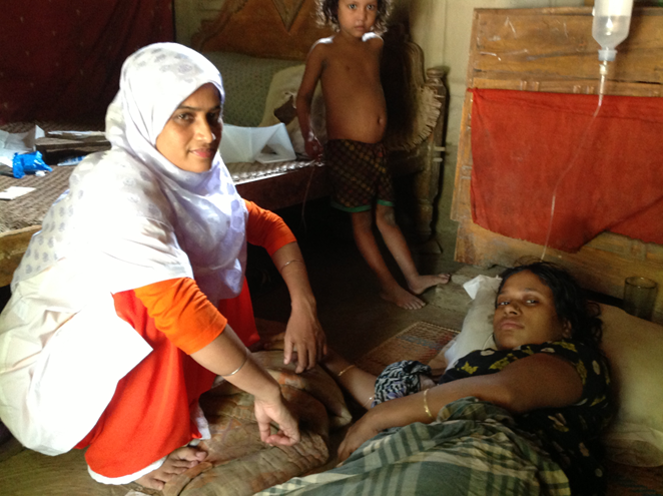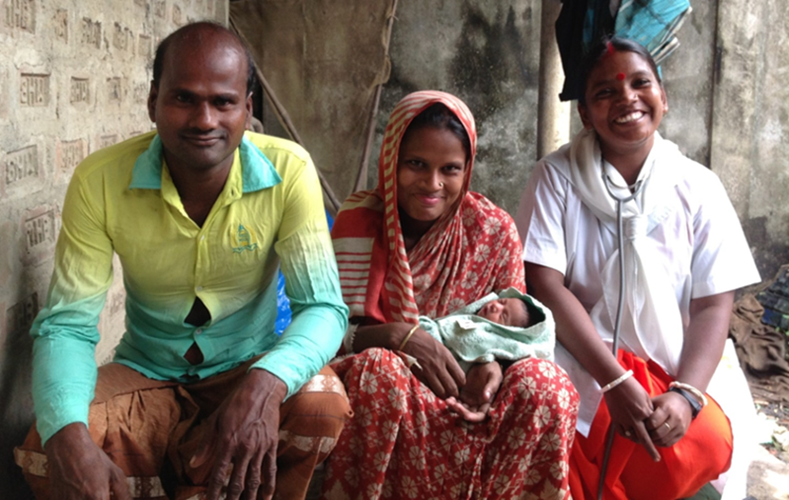Unlikely health workers in Bangladesh: Celebrating female frontline health workers on International Women’s Day

Rohima with her family and baby. Photo courtesy of CARE.
By Rina Rani Paul, CARE Bangladesh, and Mariela Rodriguez, CARE USA
Every year, on International Women’s Day, the global health community takes the opportunity to celebrate the progress made for gender equality and women’s health and rights around the world. To ensure that the lived experiences of women are celebrated on this day, let’s also celebrate the female health workers—the women fighting for gender equality and women’s health and rights on the frontlines. On this International Women’s Day, CARE celebrates Rohima and Sharmin. Two women from the same remote communities in Bangladesh whose lives intertwined in a unique way.
Rohima lived in a very remote region of Bangladesh that flooded half the year. She had just found out she was pregnant and instead of feeling excitement, she felt anxiety. Two years prior, Rohima had lost her first child at birth and her only attendant during birth was a neighbor with no training or skills. The nearest health facility was and still is 2 hours away, and the only way to get there is by boat. Sharmin lives in Rohima’s community and is a housewife with basic education. She had watched as women in her community continued to die because they were not receiving the skilled and quality maternal health care they needed.
One day Sharmin received the opportunity that changed her life, the life of her family, and Rohima’s life. Sharmin enrolled in a 6-month program in her community to be trained as a skilled birth attendant. She met the rigorous criteria for this curriculum promoted by the Ministry of Health and the National Nursing Council. Beyond that, she had the willingness to answer the phone in the middle of night for mothers who needed her; she would meet with community members at any time, and helped women deliver their babies safely.

Sharmin. Photo courtesy of CARE.
Across this region of Bangladesh, there are 300 ‘Sharmins’: private, frontline community health providers working in remote areas of the country, each providing 100 health services per month. Training in social entrepreneurship is part of the curriculum Sharmin and women like her receive. These women are not only skilled health workers; they are businesswomen as well. The services they provide are affordable and the prices are set by local government through community consultation. Their services are within the reach of average women, like Rohima. To address the health service gap for 2.8 million people in 11 sub-districts of this remote district, Sunamganj, CARE, with funding by GlaxoSmithKline, is developing women like Sharmin as skilled frontline health workers training them in primary health services and skilled delivery.
These women are filling a gap in the remote areas where otherwise skilled providers would not go, generating demand and providing quality and skilled health care for their communities.

Since CARE started training these skilled providers, service coverage has increased threefold in two years. More than 60% of the families they serve are poor or ultra-poor. Most women like Sharmin are earning $70 in a month, which makes a significant contribution to their household and their new found income is extremely motivating. Their work is also gratifying and a dignified profession. On this International Women’s Day, CARE celebrates Sharmin and Rohima. Sharmin delivered Rohima’s baby girl. The story of these women demonstrate how investment in the health workforce in Bangladesh can create long-term improvements in the provision of health services and transform the health and rights of women.
